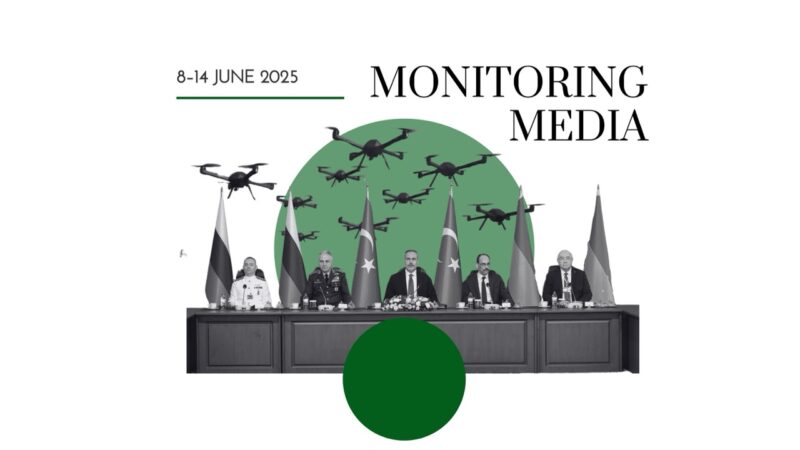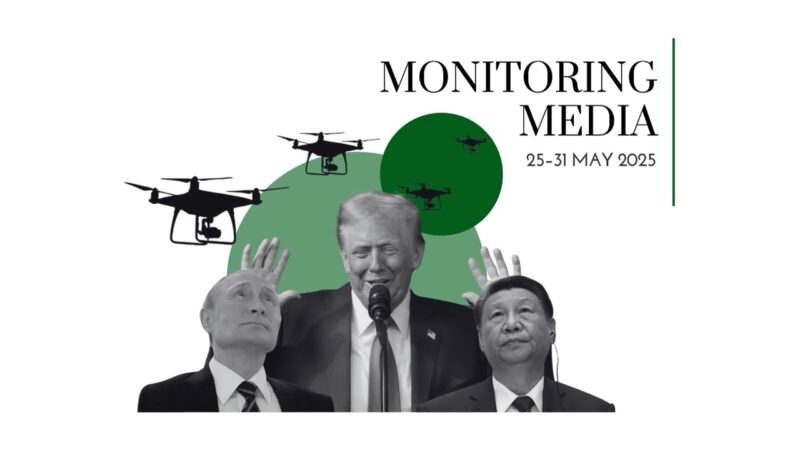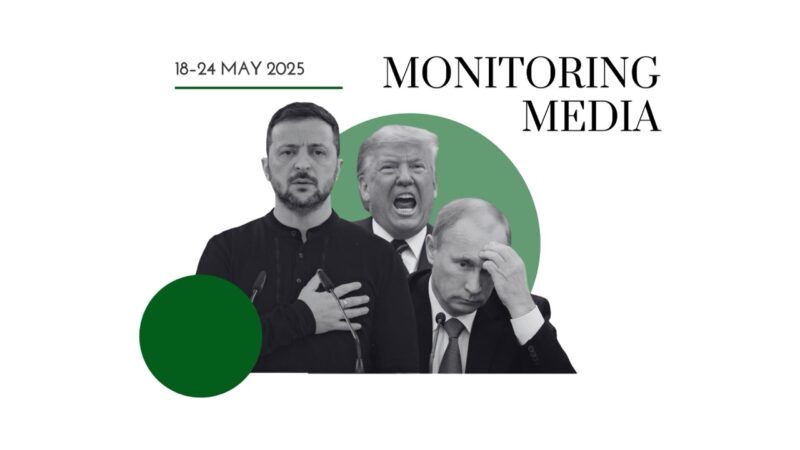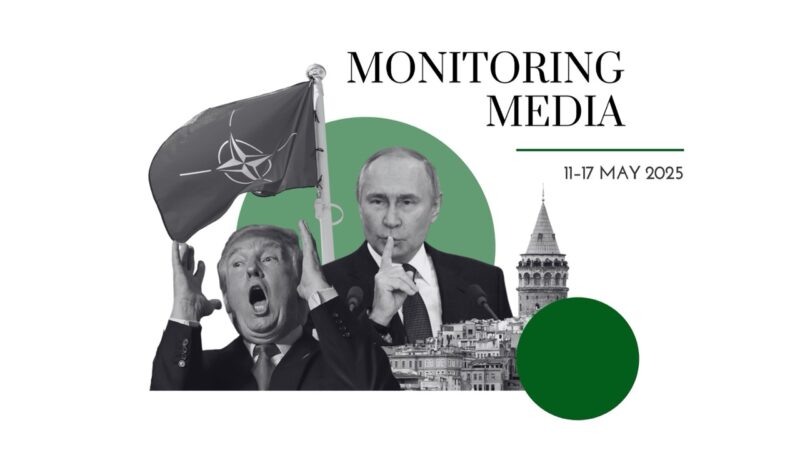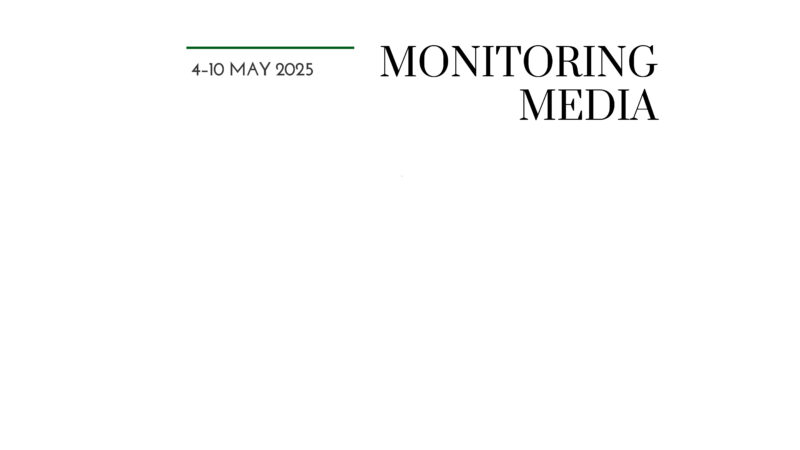Moscow’s weaponized church has long been a destructive force in Ukraine

CIUS weekly report on North American media coverage of Ukrainian affairs, 21–27 January 2024
Six publications (The National Interest, The Globe and Mail, The Economist, Foreign Affairs, National Review, and Politico) were selected to prepare this report on how Ukraine has been portrayed in the North American press during the past week. The sample was compiled based on their impact on public opinion as well as on their professional reputation, popularity among the readership, and topical relevance. These publications represent centrist viewpoints on the political spectrum.
This report covers only the most-read and relevant articles about Ukraine, as ranked by the respective North American publications themselves in the past week. Its scope covers promoted articles on home pages and articles from special sections on Ukraine, with the hashtag #Ukraine, from the paper editions of the publications, and about Ukraine from opinion columns and editorials.
Topics featured in the selected articles:
- The world and Ukraine: Ukraine is losing the drone war; Moscow’s weaponized Orthodox Patriarchate is a destructive force in Ukraine; Ukraine’s army confronts its aging problem; Europe’s statements differ from its actions in support of Ukraine;
- Russia at war: Putin continues to use Stalin’s playbook to condition Russia for a prolonged state of war; Ukraine’s Western allies must continue their assistance to Kyiv.
Main arguments:
Ukraine is losing the drone war. Eric Schmidt (Foreign Affairs) argues that if Kyiv wants to win the war, it must close the innovation gap with Moscow. The harsh winters in Eastern Europe have always been a serious obstacle to warfare, but unlike the French invasion of Russia or the Second World War, this obstacle is now being levelled by widespread use of the latest technology. In 2022, the Armed Forces of Ukraine effectively countered the Russian offensive thanks to drones and nimble adaptation of commercial technologies. Drones also played a key role in Ukraine’s success in the Black Sea in 2023. However, in the second year of its full-scale invasion, Russia adjusted its military strategy, rebuilt its economy around the military, and began to actively use innovative technologies in its military operations. According to the author, “Russia can now produce or procure around 100,000 drones per month, whereas Ukraine can only churn out half that amount.” Thus, war fatigue in Europe and the US and weakening support for Ukraine “could turn the conflict’s fragile stalemate into an opening for Russia.” That is why the West should continue to support Ukraine: “Only with more and better weapons systems—both offensive and defensive—can Ukraine turn the tide on the battlefield. Filling this gap in innovation and procurement will require sustained financial and technical support from Kyiv’s allies.”
Moscow’s weaponized church has long been a destructive force in Ukraine. Nina Shea (National Review) observes that the Moscow Patriarchate of the Russian Orthodox Church (ROC) plays a key role in Russia’s war against Ukraine. In Shea’s opinion, “Ukraine has the right to defend itself from Russia’s aggression, and that should include defending itself from a weaponized church.” Ukrainian security services have thus far arrested as “clerical spies” 68 priests and Metropolitan Pavel of Moscow’s entrenched proxy in Ukraine, the so-called “Ukrainian Orthodox Church (Moscow Patriarchate),” or UOC-MP, and the authorities plan to confiscate some UOC-MP buildings and completely ban the organization. These steps are a long-awaited response to the fact that Patriarch Kirill of the ROC blessed “the invasion before it began and now frames it as a holy war, justified by Christian theology.” The Moscow Patriarchate “works to persuade the 71 percent of the Russian population who are Orthodox that their government’s war is righteous.” The ROC has a direct interest in Russia’s victory, which would pave the way for it to regain control over Ukraine’s Orthodox churches. According to the author, “Russia’s war against Ukraine has a significant religious dimension that neither Ukraine nor the West can afford to overlook. The thoroughly politicized Moscow Orthodox Patriarchate [sic] has been instrumental in supporting this unjust war. Ukraine’s efforts to restrict it and its Ukrainian loyalists are not ‘persecution,’ but a necessity for peace.”
Ukraine’s army confronts a problem of aging. Stavros Atlamazoglou (National Interest) opines that Ukraine needs to rejuvenate its army. The “average age of a Ukrainian soldier fighting in the frontline” is currently 43. According to various estimates, more than half a million military personnel have been killed or wounded in Russia’s war against Ukraine; Russian losses exceed 320,000 people, and the rest are Ukrainians. According to Atlamazoglou, “Due to a better combat medical system—and also because Kyiv cares more about its troops—more than half of the 200,000 Ukrainian casualties are wounded, with a smaller number killed. But still, the Ukrainian military has suffered extremely heavy casualties in the 23 months of the war.” With no signs that the Russo-Ukrainian war will end any time soon, the Ukrainian government should consider changing the rules of conscription. Although older men are more experienced, they are less ready to endure active and exhausting combat. While experience offsets physical performance in defensive /operations, the “second shift” will play a key role in Ukraine’s future counteroffensives. The Russian army, on the other hand, uses young people while also mobilizing everyone it can, “including older men, convicts from its vast penal colonies, and men with infirmities who would otherwise be disqualified from serving in active combat.” The author concludes, “As the war continues and casualties mount, both sides will keep running to recruitment issues.”
Is the EU providing enough assistance to Ukraine? The editorial board of the Economist argues that there is a big gap between the way Europe describes Russia’s war against Ukraine and what it is doing to help Kyiv win. Given the calls of European officials to move to a “war economy” in countering Russian aggression and Moscow’s expanding imperial ambitions, their actual efforts to end the war are extremely limited. The announced €50 billion (C$72.6 billion) aid package for Ukraine fails to adequately meet the challenges and threats that European politicians are talking about: “Amid the self-congratulation and soaring press-conference guff about standing shoulder-to-shoulder with an embattled neighbour, it will be considered impolite to note the package is to be spread out over four years and amounts to around 0.08% of the GDP of the union in that period.” According to the Economist, there three factors affect the restriction of European aid to Ukraine: (1) the desire to keep “the authorities in Kyiv on a short leash” and, if necessary, force Ukraine to the negotiating table; (2) a limited amount of military equipment and weapons in national arsenals, against the lack of desire to help Ukraine or to increase arms production that would strengthen Europe’s strategic autonomy: “Last spring the EU promised that it would send 1m shells to Ukraine within a year; yet by late December only 300,000 had been delivered, and few think the target realistic. Meanwhile, North Korea alone (GDP 1/500th that of the EU) has managed to send Russia over 1m shells, say South Korean spooks”; and (3) Ukraine has become a hostage to internal squabbles in the EU. The Economist’s editorial board remarks, “Either Europeans are spewing nonsense about how tied their fates are to Ukraine’s, or they are being short-sighted. Either way, they are not putting their money where their mouths are.”
Seeking peace with Russia at this moment would amount to capitulation. Mark Mackinnon (Globe and Mail) interviewed Oleksandra Matviichuk, a Nobel Peace Prize laureate and head of the Centre for Civil Liberties in Ukraine, who opposes the idea of Ukraine making territorial concessions to Russia for peace. Matviichuk supports her country’s war effort, asserting that any deal leaving Russian troops on Ukrainian land would not be a true peace but rather a continued occupation. She emphasizes the harsh realities of life in Russian-controlled regions of Ukraine and advocates for the complete de-occupation of all territories. “Occupation is just another form of war. It’s no better than war, because people in occupied territories live in a grey zone without any possibilities to defend their rights, their freedom, their property and their beloved ones,” Matviichuk told Mackinnon. “Occupation is horrible. Occupation is not just changing one state flag to another; occupation means enforced disappearances, rapes, torture, filtration camps, denial of your identity, forcible adoption of your own children, mass graves.” Matviichuk criticizes the breakdown of the post–World War II international system, citing flaws in the UN Security Council and the rise of lawlessness, where aggressor states go unpunished. She warns that without strong enforcement mechanisms, wars like those in Ukraine, Azerbaijan, Venezuela, and the Middle East will persist, calling for leaders with a historic responsibility to restore the broken global order.
Putin employs Stalin’s playbook to condition Russia for prolonged state of war. Nina Khrushcheva (Globe and Mail) reminds readers of the deceptive nature of the Kremlin’s propaganda in presenting Russia, akin to the infamous Potemkin villages, as a stable and prosperous nation. Despite the claims of Russia’s economic growth, Khrushcheva argues that the reality is different, with resources being diverted to the military-industrial complex, leading to infrastructure disasters and a mass exodus of skilled individuals. The Kremlin’s efforts, reminiscent of Soviet tactics, to project an idealized image through exhibitions and propaganda serve to hide the challenges faced by Russia. The propaganda is now shifting toward a more militarized narrative, preparing Russians for prolonged war in Ukraine. Khrushcheva notes, “Potemkin would be proud of the façade created by the Kremlin’s propaganda—a distorted image hiding sham elections, a weakening economy, and increasing violence.”
Ukraine’s Western allies must continue their assistance to Kyiv. Grant Shapps (Politico) emphasizes the pivotal nature of the year 2024 for Ukraine’s democracy, highlighting the ongoing war with Russia and the need for increased international support. While acknowledging the substantial aid provided by the United Kingdom, the author urges other allies to step up with more diplomatic, economic, and military assistance to Ukraine. The UK’s commitment, including a historic security cooperation agreement, sets a strong example, but sustained momentum is called for in order to effectively counter Russia’s aggression and prevent disastrous consequences for Eastern European allies and for global stability. “Ukraine’s future is in the West’s hands. We cannot let them down. The message is clear: there can be no wavering, no fence-sitting. Putin believes the West can be worn down, and we must prove him wrong,” Shapps says. The author adds that the West must dispel any doubts about its strategic patience and affirm that it stands resolute in supporting Ukraine’s fight for democracy and freedom. At this critical juncture, Ukraine’s Western allies must ensure that Russian President Vladimir Putin’s ambitions are thwarted, sending a powerful message that the values of democracy will not be compromised.
